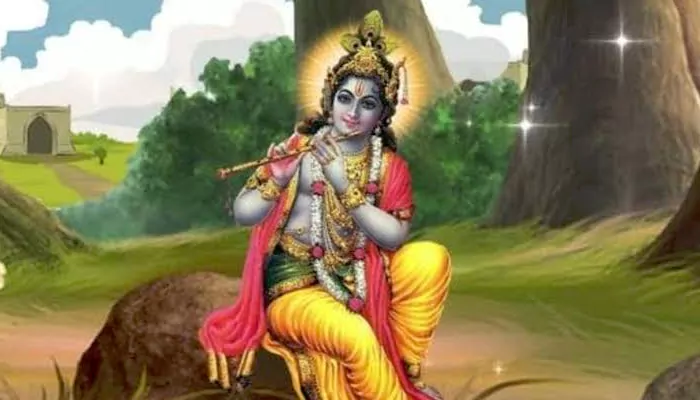
Ancient names, modern lessons: Krishna’s 108 names decoded for today’s life!
Lord Krishna, the charming cowherd of Vrindavan, the strategic mind of Kurukshetra, and the divine flute-player, is more than just a mythological figure; he is a symbol of love, wisdom, and playfulness. His 108 names, mentioned in ancient scriptures, each tell a different story about his personality, his deeds, and his relationship with the world.
Before diving into meanings, let’s decode the number itself. In Hinduism, Buddhism, and even yoga traditions, 108 is sacred. It represents the wholeness of existence—1 (unity), 0 (emptiness), and 8 (infinity).
1. Achala: The immovable one who stays steadfast in truth.
2. Achyuta: The infallible one who never falls from his divine position.
3. Adbhutah: The wondrous one who amazes with his divine acts.

4. Adideva: The original Supreme God existing before all creation.
5. Aditya: The son of Devaki and Vasudeva, shining like the sun.
6. Ananta: The eternal one with no beginning or end.
7. Anantajit: The one who is endlessly victorious.
8. Anaya: The leader who guides without coercion.
9. Aniruddha: The one who cannot be obstructed or defeated.
10. Aparajita: The unconquered one who always triumphs over evil.
11. Balaramanuja: The younger brother of Balarama.
12. Bansi: The flute player whose music enchants the universe.
13. Bansidhar: The holder of the flute, symbol of divine melody.
14. Bansilal: The beloved child of the flute.
15. Bhagavan: The possessor of all six divine opulences.
16. Bhaktavatsala: The protector who is tender towards his devotees.
17. Bhanu: The radiant one who shines like the sun.
18. Bharat: The sustainer of the Bharata (India) tradition.
19. Bhooman: The all-pervading, all-encompassing one.
20. Bihari: The wanderer who roams joyfully in Vrindavan.
21. Chaturbhuj: The four-armed one who upholds dharma.

22. Danavendra: The lord who destroys demons.
23. Dayalu: The compassionate one filled with mercy.
24. Deenabandhu: The friend of the poor and helpless.
25. Devadideva: The God of all gods.
26. Devakinandan: The beloved son of Devaki.
27. Dharmadhyaksha: The ultimate authority on righteousness.
28. Dharmajyoti: The light of righteousness.
29. Dharma-Vatsala: The nurturer of moral and spiritual values.
30. Dwarkapati: The Lord of Dwaraka.
31. Dwarkadheesh: The king who rules the city of Dwaraka.
32. Ghanashyam: The one with a dark, rain-cloud-like complexion.
33. Giridhar: The lifter of Govardhan hill to protect devotees.
34. Girdhari: The same Govardhan-lifting hero of Vrindavan.
35. Govinda: The protector of cows and senses.
36. Gopal: The caretaker and protector of cows.
37. Gopinath: The beloved Lord of the gopis.
38. Gopala: Another form of the cowherd protector.
39. Gyaneshwar: The lord of divine knowledge.
40. Hari: The remover of sins and sorrows.
41. Harinarayan: The supreme remover of pain.
42. Hrishikesha: The master of the senses.
43. Jagadbandhu: The friend of the entire world.
44. Jagadguru: The universal teacher.
45. Jagannath: The Lord of the universe.
46. Janardana: The one who protects mankind.

47. Jayanti: The victorious and celebrated one.
48. Jyotiraditya: The resplendent light of the sun.
49. Kamalnath: The Lord of the lotus.
50. Kamalnayan: The lotus-eyed one.
51. Kamalapati: The husband of Goddess Lakshmi.
52. Kamsantak: The slayer of Kamsa.
53. Kanaiya: The playful, mischievous Krishna.
54. Kanhaiya: The beloved of Vrindavan.
55. Kanhai: A fond name for little Krishna.
56. Kanu: The endearing name for the divine child.
57. Keshava: The slayer of the demon Keshi.
58. Krishna: The all-attractive Supreme Lord.
59. Krishnaya: The embodiment of divine love.
60. Kunjbihari: The one who enjoys in the groves of Vrindavan.
61. Laddu Gopal: The sweet child form of Krishna.
62. Lakshmikantam: The beloved consort of Goddess Lakshmi.
63. Loknath: The Lord of the people.
64. Madanmohan: The one who enchants even Cupid.
65. Madhava: The husband of the goddess of fortune.
66. Madhusudan: The slayer of the demon Madhu.
67. Mahadeva: The greatest of all deities.
68. Manohar: The captivating one.

69. Manmohan: The one who steals minds and hearts.
70. Mathurapati: The Lord of Mathura.
71. Mayur: The peacock feather-wearing deity.
72. Mohan: The enchanting one.
73. Muralidhar: The bearer of the flute.
74. Muralimanohar: The flute player who mesmerizes all.
75. Murari: The slayer of the demon Mura.
76. Nandakishore: The youthful son of Nanda Maharaj.
77. Nandakumar: The darling son of Nanda.
78. Nandakumara: Another affectionate name for Nanda’s son.
79. Nandalal: The beloved of Nanda’s family.
80. Narayan: The shelter of all living beings.
81. Navaneetachora: The butter thief of Vrindavan.
82. Parthasarthi: The charioteer of Arjuna in the Mahabharata.
83. Pitambar: The one dressed in yellow garments.
84. Prabhu: The supreme master.
85. Pundarikaksha: The lotus-eyed Lord.
86. Radha-Kant: The beloved of Radha.
87. Radha-Raman: The lover of Radha.
88. Radha-Vallabh: The Lord cherished by Radha.
89. Rajan: The kingly one.
90. Rajendra: The supreme ruler.
91. Rakhvala: The eternal protector.
92. Ramesh: The Lord of Goddess Lakshmi.
93. Ranchod: The one who strategically leaves the battlefield.
94. Rasbihari: The enjoyer of the divine rasa dance.
95. Rasesh: The Lord of divine play.
96. Rasik: The connoisseur of divine love.
97. Rasikendra: The king of spiritual bliss.
98. Rasikraj: The supreme enjoyer of devotion.
99. Rasikvar: The best among divine lovers.
100. Rishikesha: The Lord of the senses.
101. Satyavrat: The one devoted to truth.
102. Shyam: The dark-complexioned, charming one.

103. Shyamsundar: The beautiful dark-skinned Lord.
104. Sri Krishna: The auspicious Supreme Lord.
105. Vasudeva: The son of Vasudeva.
106. Vishweshwar: The Lord of the universe.
107. Vishwaroopa: The cosmic form of God.
108. Yashodanandan: The beloved son of Yashoda.
Krishna’s names are like an ancient self-help guide. Pick one name each day, understand its meaning, and reflect on it in your work or personal life.
From boardrooms to living rooms, from yoga mats to WhatsApp chats, Krishna’s wisdom is timeless. His names are not just divine titles; they are everyday reminders to live with purpose and grace.